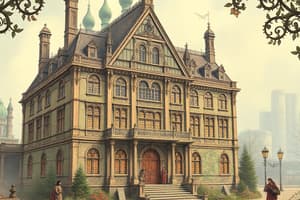Podcast
Questions and Answers
العصر القديم يشمل الفترة من حوالي 3000 قبل الميلاد إلى 500 ميلادي.
العصر القديم يشمل الفترة من حوالي 3000 قبل الميلاد إلى 500 ميلادي.
True (A)
الأسلوب التاريخي يعتمد فقط على الوثائق المكتوبة.
الأسلوب التاريخي يعتمد فقط على الوثائق المكتوبة.
False (B)
العصور الوسطى شهدت تطورات ثقافية وعلمية ملحوظة، خاصة خلال العصر الذهبي الإسلامي.
العصور الوسطى شهدت تطورات ثقافية وعلمية ملحوظة، خاصة خلال العصر الذهبي الإسلامي.
True (A)
غالبية الفترات التاريخية تتفق على نفس التعبيرات المنهجية والكتابية.
غالبية الفترات التاريخية تتفق على نفس التعبيرات المنهجية والكتابية.
حركة النهضة كانت جزءاً من الفترة الحديثة في التاريخ.
حركة النهضة كانت جزءاً من الفترة الحديثة في التاريخ.
Flashcards are hidden until you start studying
Study Notes
Definition of History
- The study of past events, particularly in human affairs.
- Involves analysis of historical documents, artifacts, and other sources.
Importance of History
- Provides context for current events and societal changes.
- Helps understand cultural heritage and identity.
- Aids in learning from past mistakes and successes.
Major Periods in History
-
Prehistoric Era
- Time before written records.
- Relies on archaeology for insights.
-
Ancient History (c. 3000 BCE - 500 CE)
- Includes the rise of civilizations (Mesopotamia, Egypt, Indus Valley).
- Development of writing, trade, and major religions.
-
Classical Antiquity (c. 500 BCE - 500 CE)
- Greek and Roman empires; innovations in philosophy, governance, and art.
- Spread of major religions like Christianity and Buddhism.
-
Middle Ages (c. 500 - 1500 CE)
- Feudalism in Europe, the rise of Islam.
- Cultural and scientific advancements, notably in the Islamic Golden Age.
-
Early Modern Period (c. 1500 - 1800)
- Renaissance, Reformation, and Age of Discovery.
- Emergence of nation-states and colonialism.
-
Modern History (c. 1800 - present)
- Industrial Revolution and advancements in technology.
- Key events: World Wars, Cold War, globalization.
Key Concepts in History
-
Historical Methodology
- Use of primary and secondary sources.
- Critical analysis and interpretation of evidence.
-
Historiography
- Study of how history is written and interpreted.
- Different schools of thought (e.g., Marxist, feminist, post-colonial).
-
Chronology
- The arrangement of events in the order they occurred.
- Understanding timelines is crucial for context.
Significant Historical Figures
- Alexander the Great: Conqueror who spread Hellenistic culture.
- Julius Caesar: Roman general who played a critical role in the demise of the Roman Republic.
- Mahatma Gandhi: Leader of Indian independence movement through nonviolent resistance.
- Martin Luther King Jr.: Prominent leader in the American civil rights movement.
Methods of Historical Research
- Archaeological excavations.
- Analysis of written records (letters, official documents, newspapers).
- Oral histories and interviews.
Challenges in History
- Bias in sources and interpretation.
- Incomplete records leading to gaps in knowledge.
- The impact of present-day perspectives on understanding the past.
تعريف التاريخ
- دراسة الأحداث الماضية، خاصة في الشؤون الإنسانية.
- يتضمن تحليل الوثائق التاريخية، القطع الأثرية، ومصادر أخرى.
أهمية التاريخ
- يوفر سياقاً للأحداث الحالية والتغيرات المجتمعية.
- يساعد في فهم التراث الثقافي والهوية.
- يساعد على التعلم من الأخطاء والنجاحات الماضية.
الفترات الرئيسية في التاريخ
-
العصر ما قبل التاريخ
- فترة قبل السجلات المكتوبة.
- يعتمد على علم الآثار للحصول على رؤى.
-
التاريخ القديم (حوالي 3000 ق.م - 500 م)
- يشمل ظهور الحضارات مثل بلاد ما بين النهرين، مصر، ووادي السند.
- تطور الكتابة والتجارة والأديان الكبرى.
-
العصور الكلاسيكية (حوالي 500 ق.م - 500 م)
- الإمبراطوريات اليونانية والرومانية؛ ابتكارات في الفلسفة، الحكم، والفن.
- انتشار الأديان الكبرى مثل المسيحية والبوذية.
-
العصور الوسطى (حوالي 500 - 1500 م)
- الفوائد في أوروبا، وظهور الإسلام.
- تقدم ثقافي وعلمي، خاصة في فترة الازدهار الإسلامي.
-
العصر الحديث المبكر (حوالي 1500 - 1800)
- عصر النهضة، الإصلاح، وعصر الاكتشافات.
- ظهور الدول القومية والاستعمار.
-
التاريخ الحديث (حوالي 1800 - الحاضر)
- الثورة الصناعية والتقدم التكنولوجي.
- أحداث رئيسية: الحروب العالمية، الحرب الباردة، والعولمة.
المفاهيم الرئيسية في التاريخ
-
المنهج التاريخي
- استخدام المصادر الأولية والثانوية.
- التحليل النقدي وتفسير الأدلة.
-
الكتابة التاريخية
- دراسة كيفية كتابة التاريخ وتفسيره.
- مدارس فكر مختلفة (مثل الماركسية، النسوية، ما بعد الاستعمار).
-
الزمنية
- ترتيب الأحداث في تسلسلها الزمني.
- فهم الجداول الزمنية مهم للسياق.
شخصيات تاريخية بارزة
- الإسكندر الأكبر: فاتح نشر الثقافة الهلنستية.
- يوليوس قيصر: جنرال روماني لعب دوراً حاسماً في انهيار الجمهورية الرومانية.
- المهاتما غاندي: قائد حركة استقلال الهند من خلال المقاومة السلمية.
- مارتن لوثر كينغ جونيور: قائد بارز في حركة الحقوق المدنية الأمريكية.
طرق البحث التاريخي
- التنقيبات الأثرية.
- تحليل السجلات المكتوبة (الرسائل، الوثائق الرسمية، الصحف).
- التاريخ الشفوي والمقابلات.
التحديات في التاريخ
- التحيز في المصادر والتفسير.
- السجلات الناقصة التي تؤدي إلى فجوات في المعرفة.
- تأثير وجهات النظر المعاصرة على فهم الماضي.
Studying That Suits You
Use AI to generate personalized quizzes and flashcards to suit your learning preferences.




